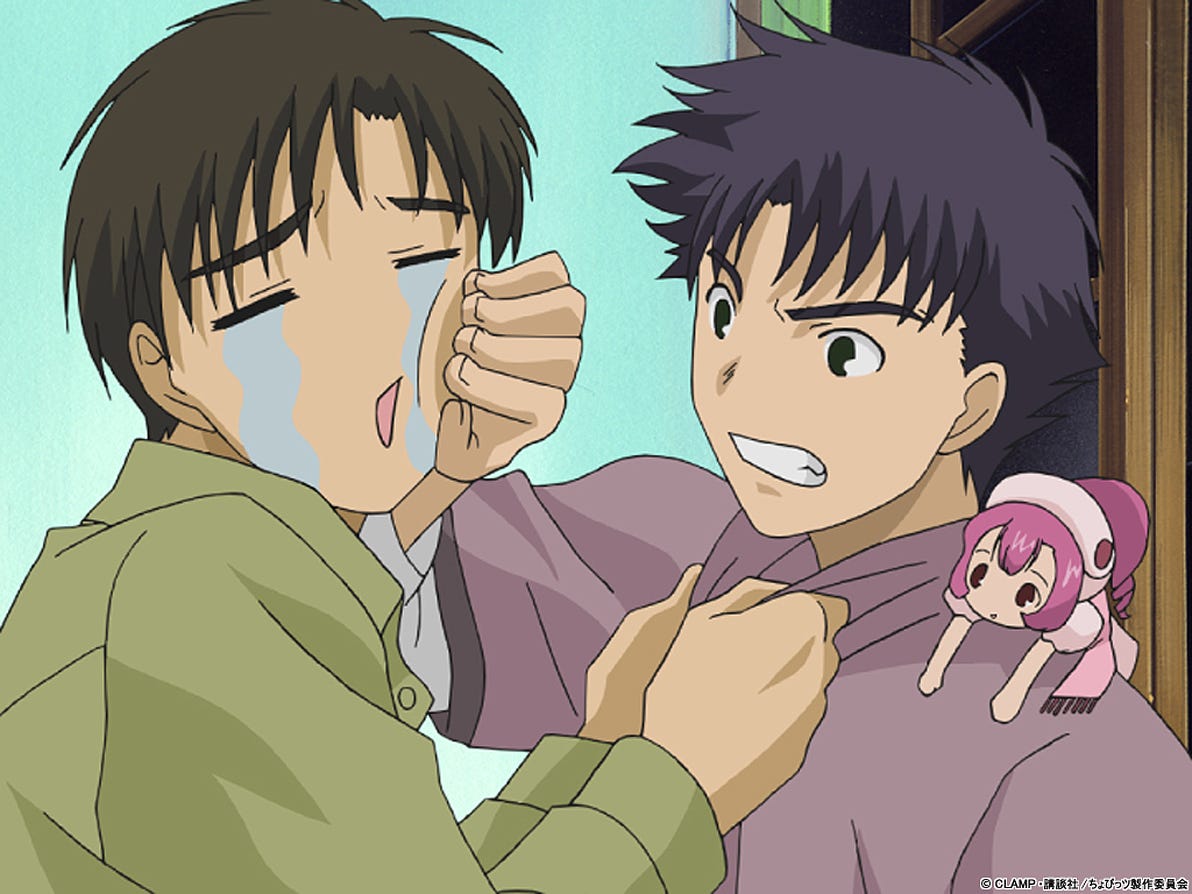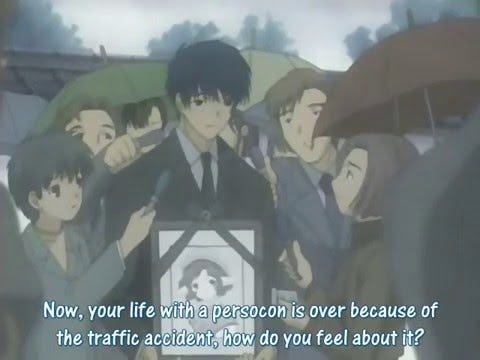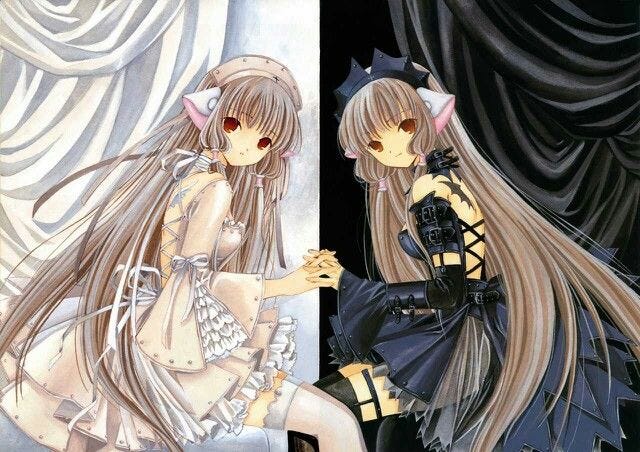The place was Japan, the year 2002. A terrible CLAMP1 manga (lit. ‘Japanese Comic Book’) was chosen to be adapted into an A·ni·me, a brand new techwizardry designed to salvage kinomatic value out of half-baked panels and plots.
It was a good attempt. Unfortunately for humanity, it didn’t work.
Okay, maybe it worked if their goal was pander to the worst of desires of 2002’s sex-starved otakus (lit. ‘Japanese Comic Book Incel’), in which case it was a resounding success. I’m sure Chobits makes it into plenty of I FUCKING LOVE NOSTALGIA2-style best-of lists even today, like Ranma 1/2 and Cowboy Bebop, when realistically they should feature exclusively in trash-of-the-2000s lists.
The problem—the real problem—is Society. We consume terrible content as tweens,3 permanently ensconce it into our personal mythologies, then pass it down uncritically like the dream of a fucked up Dawkins-Kojima fusion.
But don’t worry, I’m here to review it after watching it for the first time. I’m immune to nostalgia. In fact, you could call me the Nostalgia Cr—
First of all, I have to admit the opening is a banger. Give it a listen.
Chobits features Hideki Motosuwa, the most featureless, vapid 18 year old male protagonist of our time. Even for 2002, his personality amounts to “he likes and gets flustered around sexy girls”, which I suppose is not an uncommon trait for 18 year old males. Maybe not to such an encompassing extent. He stands out even for 2000s anime, only being salvaged by being a “nice guy”—actually no, that makes him even worse.
His backstory: he’s a farmer4 with no family, friends or human contact of any kind, who suddenly decides to go to university. He optimistically sells everything and moves to the big city, but fails his entry exam catastrophically. With barely any money to his name, he has no choice but to move to the cheapest one-room flat in Tokyo and join a preparatory school, so he can attempt to pass the exam the following year.
His thoughts are elsewhere, however, because—being a farmer in the middle of nowhere with apparently no access to any media—he’d failed to learn that robots are a thing. Nearly everyone in Tokyo owns a ‘Persocom’, an intelligent android5 that people own, put to work and have sex with. Don’t worry, the androids say they’re not sentient. This is all seen through a saccharine, uplifting viewpoint, and there will be no mention of robot rights throughout the vast majority of the anime, unless it concerns the designated waifu. Even then, not to the extent even the laziest sci-fi story would reach.
In a suspiciously allegorical way, our virgin protagonist finds a robot girl in the literal trash. He decides to drag her home instead of calling the cops, because, you see, he really wants a free Persocom, as his neighbor and future best friend owns one, and they seem cool.
After trying everything to wake her up with no luck, Hideki—in a Trumpian move—decides to grab her by her nether regions. Fortunately for him, it turns out that’s where her power switch is.6
The new problem is that she has no memories whatsoever. She can only say the word “chi”, which becomes her name thanks to our main character’s low intelligence stat. Hideki, someone who can barely take care of himself, is going to need to take care of what’s effectively a baby, and then bang it.
Welcome to Chobits!
Throughout the middle half of the story, Chi is exposed to more and more areas of modern life, from shopping, to public baths, to OnlyFans, in the most boring and unengaging ways possible. About half the jokes are Hideki catching Chi in a compromising position and going EHHHHH? and shooting blood from his nose, because this is an early 2000s anime.
This section of the anime is completely worthless. There is no character development, and whatever minor clues you get are restricted to single scenes, not truly embedded in the episodic plotlines. The hints amount to the following: Chi might be part of a mysterious robot series known as the “Chobits”, who have some unknown power over all other persocoms. Chi might have something similar to an alternate self inside her. Chi has access to a time machine. Okay, that last one is a lie.
I’m not going to look it up because I’ve had enough Chobits for a lifetime, but I’m pretty sure the manga is the same. Maybe this used to be more entertaining in 2002, but I will cynically come out and say the creators just wanted to stretch it out so they could sell more volumes.
As it reaches the final quarter of the story, things actually start to happen. The backstories of previously-boring supporting characters are revealed and—you know what? They’re actually interesting. They’re downright thematic.7 Does this excuse their treatment in previous episodes? Not at all.
The ara-aratic housewife landlord turns out to be a retired and depressed Persocom designer. The bishounen baker turns out to be one of the first to marry a Persocom in Japan, and has a tragic tale to go with it. Hideki’s teacher had his husband leave her for a Persocom. Yeah, this is what would actually happen if people started making cute girl robots.8
It makes me wonder why not every episode is like this. Surely they knew Chi doing slice-of-life things could not fill the 15 episodes it did. Hell, the show could ask questions like “what does it mean to be conscious?”, or even “how is Chi different from a 5 year old child and why isn’t it unethical to bang her after knowing her for two months?”
Back to the bishounen baker (pictured above), his persocom wife was an old model, and her hard drive started failing.9 This meant she kept fewer and fewer memories every day, until she started forgetting her husband. The baker takes her to the robot shop, and he’s told that the drive is too damaged to port the data to a different bot because of some technobabble, but they could replace the drive and keep the physical body.
The baker refuses. He decides that even if her memories go away, something of the original wife will remain in the old model, so we see him take care of his robot waifu in scenes reminiscent of the stages of dementia. Before that, however, I was struck by the need for technobabble at all. Why does the transfer need to be impossible? You could have brought up the Ship of Theseus and say “yeah but it wouldn’t be her, only the data would be transferred!”.
In short, the show consistently refuses to even try to be clever in any way, shape or form.
What the show doesn’t refuse to be is cheaply melodramatic.
Two episodes before the end, the backstory is finally revealed. Chi10 used to have a sister, Freya. They were both built by the landlady and her husband because they couldn’t have children, and they were unique in being robots with the ability to fall in love. Unfortunately, Freya nigh instantly falls in love with her father, and after understandably being rejected, chooses to kill herself. Chi stops her and tells her to transfer her code to her own body, so she can “protect her”. This is the mysterious old self that shows up sometimes.
After her husband dies of an illness, the landlady decides to wipe Chi’s memories and dumps her in the trash so she can find love without all that baggage haunting her. I mean. Who does that to their daughter? Why not just make her a Tinder account? Just admit you hadn’t planned this far ahead, man-gakas.
Hideki finds her at this point. Throughout the show, Chi and Hideki become enamored… shit, the show is ending and we’ve explained everything, where are the stakes? Let’s make something up.
For no reason at all (I suppose this might be better explained in the manga), it turns out the husband had coded Chi to start a program the moment she chose a man to be with. The program, I guess (also poorly explained), allows every single robot—not just the two Chobits—to fall in love. As Chi finally chooses Hideki, in classic anime fashion, we see a big aura of light spreading through Tokyo. When the light fades, two minor persocom characters are blushing at each other and not understanding why. Bravo, Nolan.
Yeah, the show instantly ends right there.
I don’t even know what to say. Why didn’t I review Lain instead?
2/10 - Don’t do this to yourself
Wait, there’s more! If you do this to yourself, I made an episode list so you can skip all the filler, inspired by the amazing Star Trek ones:
They did Cardcaptor Sakura and the character designs for Code Geass, but most will agree their most significant contribution to the anime zeitgeist is a Jojo’s Bizarre Adventure doujin featuring a mpreg!Kakyoin and a gay baby by the name of Jouta.
Some people fucking love other franchises.
Not to be confused with the animation practice of tweening, which is never used in the hand-drawn Chobits. No, you’ll get a lot of panning over static shots instead.
I’m sure this is often brought up by other reviewers, but ‘farmer’ being a profitable human occupation in a world that has invented perfect robotics stretches the bounds of believability. This story would work much better in a world with Star Trek’s society.
Using ‘android’ here to mean robot made to look human, not human with mechanical parts, which is sometimes the case.
Okay, sure, we see other persocoms have less dumb locations later, so it’s possible she doesn’t have a wake-up switch at all and it was her anti-rape defense mechanism—god I can’t believe I’m typing this and it’s all true.
This is like, two episodes though. Chobits isn’t very long, thank god.
See this documentary.
Remember kids, don’t buy Seagate.
She had an original name which I instantly forgot, and even in the show people prefer Chi so who cares.









